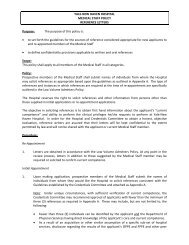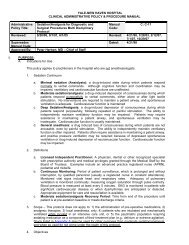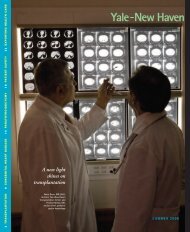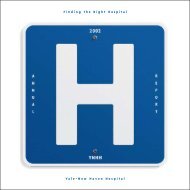Observers - Yale-New Haven Hospital
Observers - Yale-New Haven Hospital
Observers - Yale-New Haven Hospital
Create successful ePaper yourself
Turn your PDF publications into a flip-book with our unique Google optimized e-Paper software.
BE PREPARED TO ACT QUICKLY, CORRECTLY AND CALMLY:<br />
Be familiar with the basic elements of the <strong>Hospital</strong>’s Emergency Preparedness Plan found in the<br />
Safety Manual. This is a detailed emergency response plan that describes how to report<br />
emergencies, assigns responsibilities for coordinating and carrying out evacuations, reviews the level<br />
of response to a disaster, examines how we will deal with specific emergencies and reviews the<br />
Weather Contingency Plan.<br />
Know how to recognize and turn on emergency alarms.<br />
Know what to do in an emergency, including assisting patients, evacuation routes, where fire<br />
extinguishers, fire hoses and fire pull stations are located, how to use a fire extinguisher, the<br />
<strong>Hospital</strong>’s emergency phone number (119), who to call, etc.<br />
FIRE SAFETY<br />
Q. What Do You Do In The Event Of A Fire In The <strong>Hospital</strong><br />
A. Follow The R.A.C.E. Protocol:<br />
R= Rescue anyone in immediate danger<br />
A= Sound the Alarm - activate a pull station, phone “119” (the <strong>Hospital</strong>’s Emergency Page<br />
Phone Number) to report<br />
C= Close all doors, chutes, windows, etc. to Confine the smoke/fire<br />
E= Extinguish the fire by using a handheld fire extinguisher<br />
The overhead paging system will signal with a set of three chimes and announce "Order Number One,<br />
(the location - building and floor)" three times. NOTE: Normal overhead paging is suspended during the<br />
time of a fire emergency except for Code 5 or Code 7 emergencies (adult or pediatric respiratory or<br />
cardiac arrests).<br />
Never open a door if it is hot to the touch. Keep fire doors closed and automatically closing fire doors,<br />
corridors and stairwells free of obstructions.<br />
Patient evacuation is only performed in the event of a large, uncontrollable fire or other widespread<br />
disaster where patient care and the infrastructure of the building are compromised. Horizontal evacuation<br />
is performed - exit through a set of bi-swing, automatically closing fire doors to the safe area beyond the<br />
doors. In the event that further evacuation is necessary, evacuate to a lower floor by using the stairs<br />
(never a higher floor). House Staff, Nursing Staff and the <strong>New</strong> <strong>Haven</strong> Fire Department control patient<br />
evacuation with assistance from the <strong>Hospital</strong>’s Emergency Response Team (ERT). Elevators cannot be<br />
used, except at the discretion of the <strong>New</strong> <strong>Haven</strong> Fire Department who take control of the fire situation<br />
upon arrival.<br />
Every area and room of the <strong>Hospital</strong> contain smoke detectors and sprinklers. It is extremely unlikely that<br />
patient evacuation will need to be performed in the event of a fire.<br />
There is no smoking in the <strong>Hospital</strong>. If you smoke, you need to do so in the smoking enclosure that is<br />
outside the main entrance to the <strong>Hospital</strong>. There is no smoking outside any of the entrance doors to the<br />
<strong>Hospital</strong>. All smoking materials are to be disposed of in the appropriate receptacle.<br />
Q. How Do You Use A Handheld Fire Extinguisher<br />
A. Follow P.A.S.S.:<br />
P= Pull the pin at the top of the extinguisher<br />
A= Aim at the base of the fire<br />
S= Squeeze the top handle to the bottom handle<br />
S= Sweep the horn, hose or nozzle from side-to-side as you extinguish the flames<br />
12


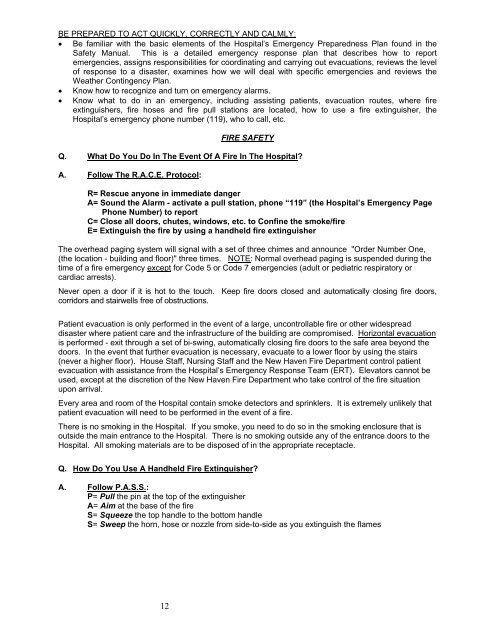



![Annual Report Donor Listings [pdf] - Yale-New Haven Hospital](https://img.yumpu.com/49673575/1/190x245/annual-report-donor-listings-pdf-yale-new-haven-hospital.jpg?quality=85)

